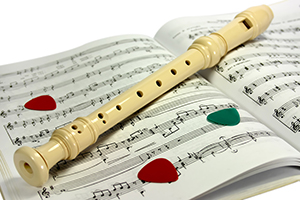 In September 2017, the Ig Nobel prizes were once again handed out to researchers who have contributed unusual research that nevertheless contributes valuable knowledge to the scientific community.
In September 2017, the Ig Nobel prizes were once again handed out to researchers who have contributed unusual research that nevertheless contributes valuable knowledge to the scientific community.
The Ig Nobel peace prize was awarded to scientists from Switzerland, Canada, the Netherlands, and the USA for a study showing that playing a specific instrument can both cure snoring and sleep apnea.
The study is not new. It was published in 2006 in the journal BMJ, but since it has just been rewarded for its ingenuity, it is worth revisiting it.
The authors of the study identified the collapsing of the airway as one of the most central difficulties of people struggling with sleep apnea and snoring.
They then wondered whether people’s airways could be opened and trained to remain open during the night by making them play wind instruments.
They recruited 25 patients and divided them into a treatment group and a control group.
People in the treatment group were given didgeridoo lessons and practiced for 25 minutes, 6 days a week, which shows remarkable dedication.
The control group remained on the waiting list for didgeridoo lessons.
The scientists then tested their daytime sleepiness, their sleep quality (on the Pittsburgh quality of sleep index), their apnoea-hypopnoea index score, their partner’s assessment of their sleep disturbance, and their general health-related quality of life.
Compared to the control group, the didgeridoo player’s daytime sleepiness and apnoea-hypopnoea scores improved significantly, and their partners reported sleeping much better than before and being disturbed a lot less.
Following this study, a different research team wondered in 2012 whether this would work with other wind instruments too, publishing their study in the Journal of Clinical Sleep Medicine.
Like the authors of the earlier study, their hypothesis was that playing a wind instrument could train the respiratory muscles to keep the upper airway open, and thereby facilitate better breathing during sleep.
They identified 906 active musicians and, through online questionnaires, asked them about sleep apnea, snoring, general health, and instrument playing.
Musicians who played double reed instruments were much less likely to suffer sleep apnea and snoring than those who played non-wind instruments. The longer they had played their double reed instruments, the less likely they were to struggle with these.
People who played other wind instruments did not differ significantly from those who played non-wind instruments.
Double reed instruments include the bassoon, the reed contrabass, and the oboe (of which the English horn is one). They exclude the clarinet, saxophone, and flute.
Therefore, if you want to tackle your snoring and sleep apnea and acquire a new hobby at the same time, learn to play one of these instruments and find out whether your snoring or your playing irritates your partner most.
The real interesting thing for me however is the scientific proof that you can train your throat to stay open day and night and therefore cure snoring and sleep apnea.
And this is exactly what I’ve been teaching for over a decade, using my simple throat, jaw and tongue exercises. The only difference is, you don’t have to play music or use any kind of instrument. Plus these simple exercises work for almost everyone.

 Multiple Sclerosis
Multiple Sclerosis Banishing Bronchitis
Banishing Bronchitis Gum Disease Gone
Gum Disease Gone Overcoming Onychomycosis
Overcoming Onychomycosis Neuropathy No More
Neuropathy No More The Prostate Protocol
The Prostate Protocol Brain Booster
Brain Booster
 Ironbound
Ironbound
 Solution for Shingles
Solution for Shingles
 The Bone Density Solution
The Bone Density Solution
 The Ultimate Healing Protocol
The Ultimate Healing Protocol
 The Parkinson's Protocol
The Parkinson's Protocol
 The Chronic Kidney Disease Solution
The Chronic Kidney Disease Solution
 Overthrowing Anxiety
Overthrowing Anxiety The Fatty Liver Solution
The Fatty Liver Solution The Hypothyroidism Solution
The Hypothyroidism Solution
 The End of Gout
The End of Gout The Blood Pressure Program
The Blood Pressure Program
 The Oxigized Cholesterol Strategy
The Oxigized Cholesterol Strategy
 Stop Snoring And Sleep Apnea Program
Stop Snoring And Sleep Apnea Program
 The Arthritis Strategy
The Arthritis Strategy The Vertigo & Dizziness Program
The Vertigo & Dizziness Program The 3-Step Diabetes Strategy
The 3-Step Diabetes Strategy Hemorrhoids Healing Protocol
Hemorrhoids Healing Protocol The Erectile Dysfunction Master
The Erectile Dysfunction Master Weight Loss Breeze
Weight Loss Breeze The IBS Program
The IBS Program The Insomnia Program
The Insomnia Program The Migraine and Headache Program
The Migraine and Headache Program The Neck Pain Solution
The Neck Pain Solution The Menopause Solution
The Menopause Solution The Ejaculation Master
The Ejaculation Master The TMJ Solution
The TMJ Solution The Acid Reflux Solution
The Acid Reflux Solution The Fibromyalgia Solution
The Fibromyalgia Solution The Psoriasis Strategy
The Psoriasis Strategy